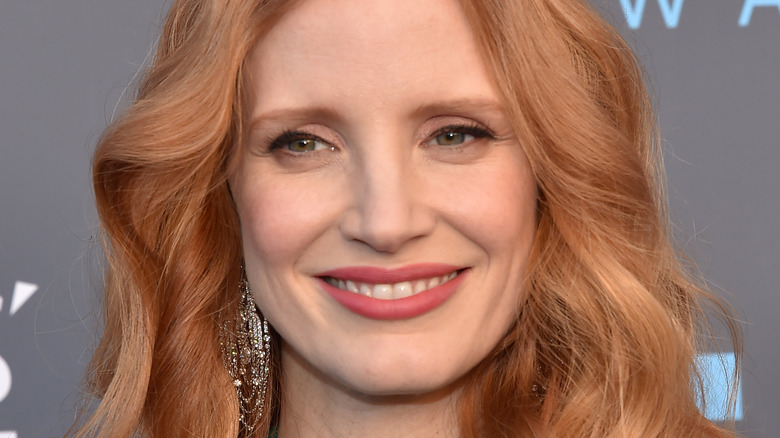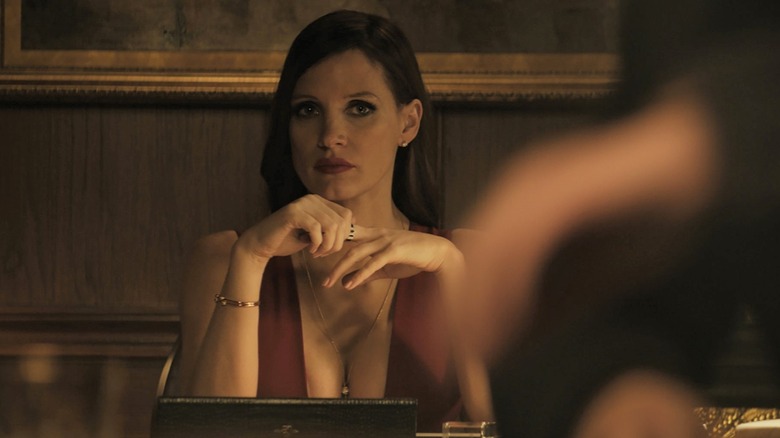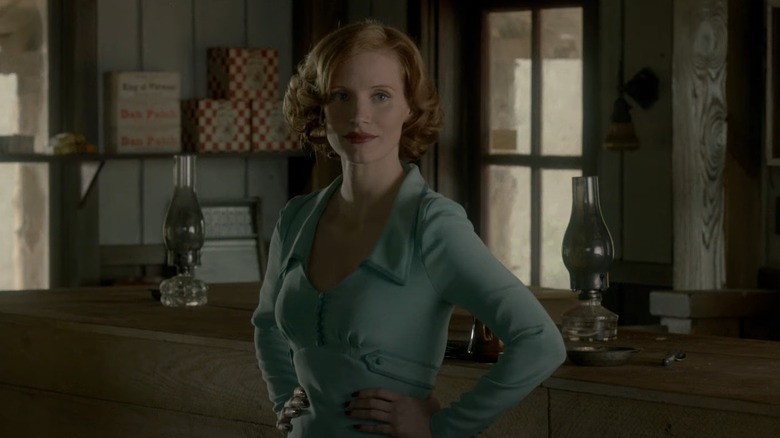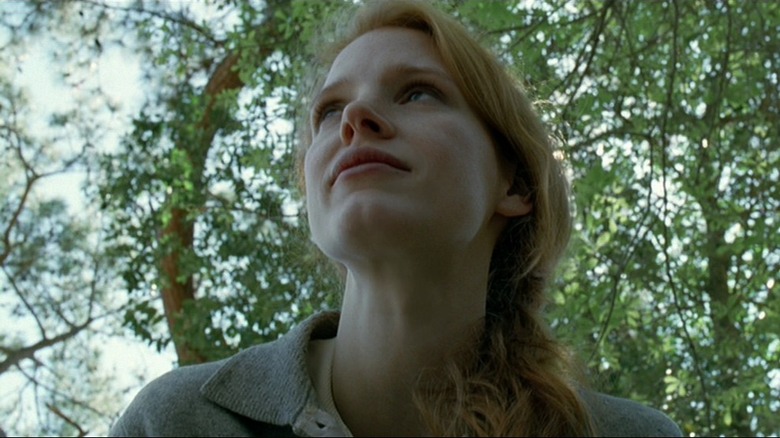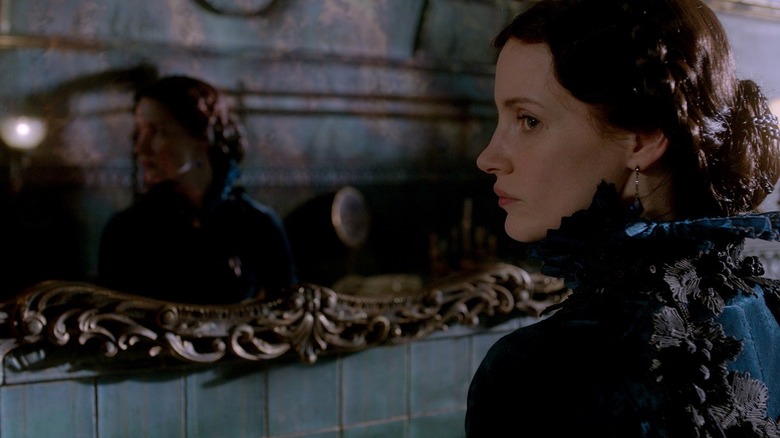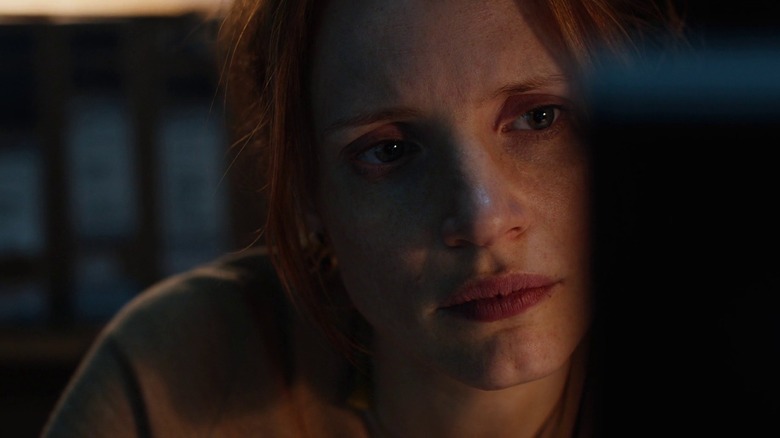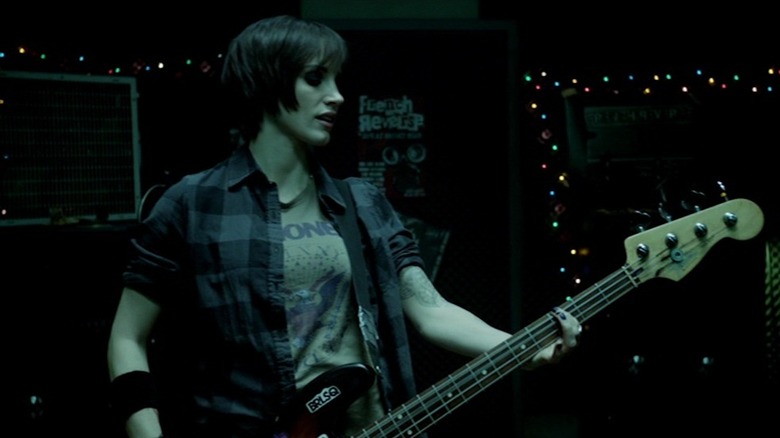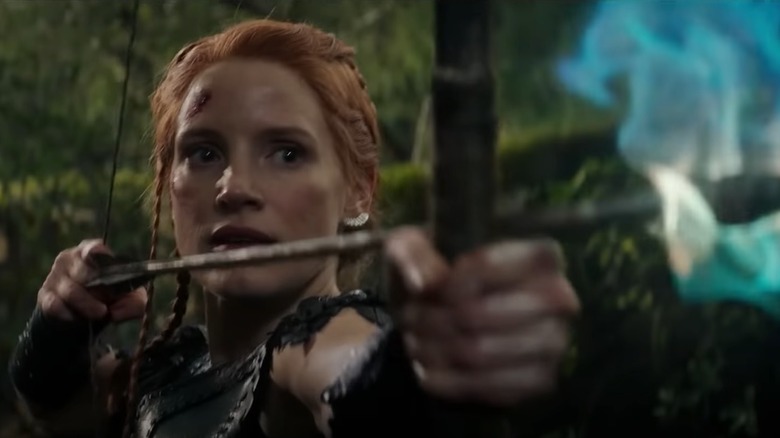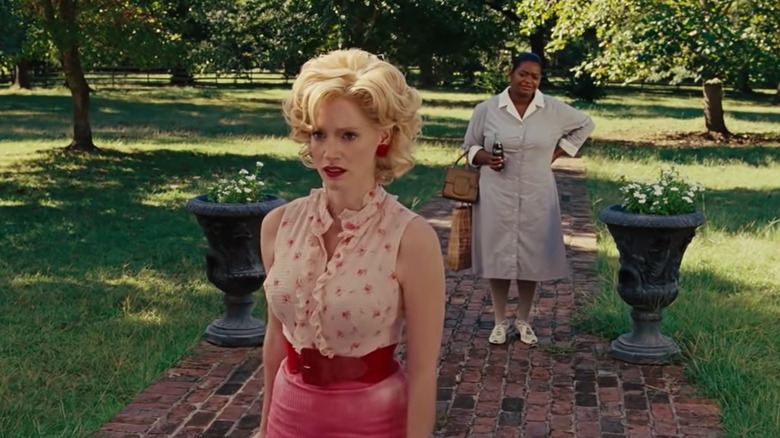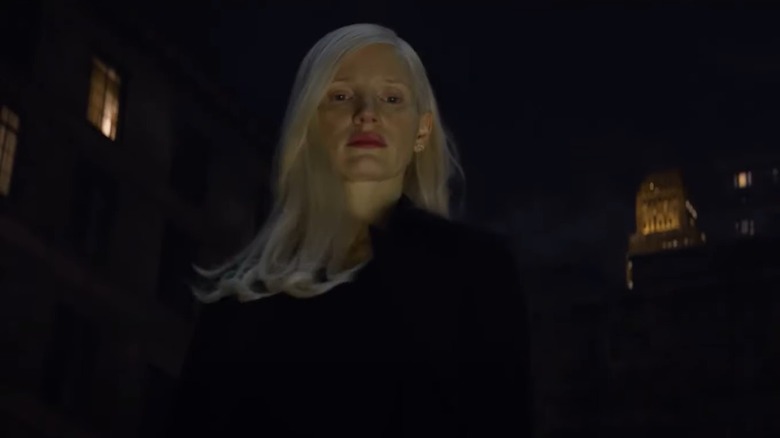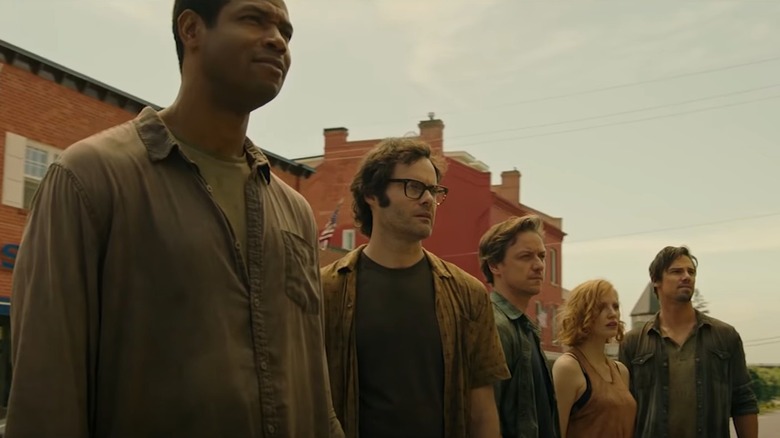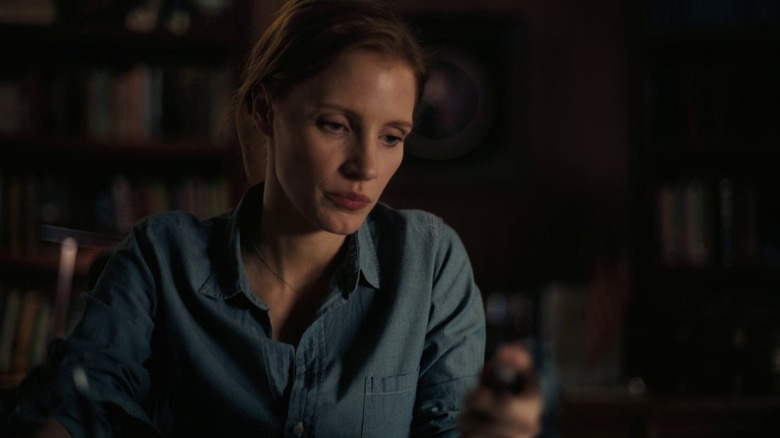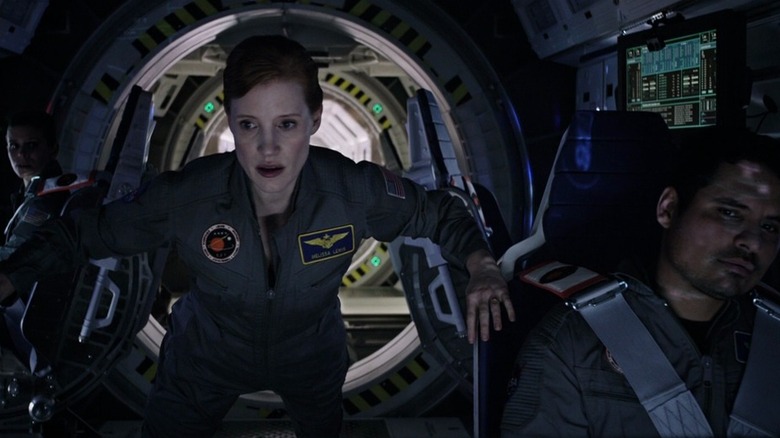The Biggest Jessica Chastain Movies Of All Time
When it comes to how Jessica Chastain chooses her projects, this performer tends to gravitate towards the unknown. "I'm really inspired by stories I didn't know about," Chastain explained to Backstage. "I look at all the ingredients of a film and say, 'Is this a positive thing that I'm putting into the world? Is there honor and respect in the way the story is being told about them? And would they approve of that?'"
Going this route has resulted in Chastain starring in a slew of movies that have deeply connected to people. Not only have her films provided "a positive thing" or two for viewers to latch onto, but they tend to highlight Chastain's incredible versatility across all genres. From contemplative dramas to sci-fi films to throwback horror titles, Chastain is as committed to variety as she is to positivity.
So it should come as no surprise that Jessica Chastain's movies perform pretty well at the worldwide box office. But which ones are her highest-grossing films? Well, get ready to visit outer space, the Middle East, and the creepy world of Stephen King as we look at the biggest movies of Chastain's career, how much they earned, and why the actress and her films are so universally beloved.
Molly's Game
With "Molly's Game," screenwriter Aaron Sorkin was taking on the new task of directing a feature film. Though he'd penned the scripts for some of the most acclaimed motion pictures of the preceding few decades, this would be the first time Sorkin had ever stepped behind the camera to handle the execution of one of his own screenplays. Along for the ride would be Jessica Chastain, inhabiting the titular lead role of Molly Bloom, a professional skier who would go on to run a prestigious (and very illegal) poker-playing organization.
However, for every Sorkin flick that had been a hit, like "The Social Network," there had also been screenplays like "Charlie Wilson's War" that just didn't connect with audiences. This meant it was anyone's guess as to where "Molly's Game" would fall on the table. It turned out to be a tidy moneymaker, though, thanks to a $53.2 million sum. While not quite double its $30 million budget, "Molly's Game" still fared fine considering it didn't utilize as big of actors or cover as famous of a real-life subject matter as some of Sorkin's prior scripts. "Molly's Game" got as high as it did thanks to a sleek marketing campaign that emphasized both the rapid-fire dialogue and its morally flexible protagonist. A smattering of awards season attention didn't hurt either. Thanks to these elements, Sorkin's first foray into directing fared decently at the box office.
Lawless
Much of the marketing for "Lawless" rested on the presence of Shia LaBeouf and Tom Hardy, as well as elements that have traditionally been thought of as having heavy amounts of appeal for male moviegoers, such as a grim atmosphere and bullets flying across the screen. But it wasn't just guys being dudes that dominated the "Lawless" marketing. Jessica Chastain was also around to help solidify this feature as a more prestigious version of a gangster pic. After all, at the time of its 2012 release, Chastain was the one with the Oscar nomination while LaBeouf and Hardy had zero Oscar nods to their names.
The presence of Chastain and these other notable actors made sure that "Lawless" would stand out over Labor Day weekend 2012. In its worldwide box office run, "Lawless" scored $54.3 million, the majority of which came from its North American run. Its tale of gangster activity in America's Deep South probably didn't have much appeal to international moviegoers, hence why grosses outside of North American territories were limited. But the folks that did show up to "Lawless" did so largely because of the big name actors, like Chastain, who showed up on the poster and not just because it was another shoot-'em-up crime picture.
The Tree of Life
A Terrence Malick movie isn't the first thing somebody thinks of when contemplating surefire box office hits. With his slow pacing, long runtimes, and tendency to eschew plot in favor of stirring imagery, Malick's boundary-pushing works are bound to alienate people as often as they enchant them. But with "The Tree of Life," one of Chastain's earliest lead roles, Malick crafted something that actually did cross over into the general public. In the summer of 2011, when Transformers and wizards ruled multiplexes, Malick also found his way into the world of box office glory.
In its worldwide run, "The Tree of Life" grossed $61.7 million, which included an impressive $48.4 million from international territories. Even domestically, the film's $13.3 million haul put it ahead of all but one of Malick's directorial efforts. The presence of Brad Pitt in the marketing materials, as well as extra special amounts of critical acclaim – not to mention how sharply "Tree of Life" contrasted with traditional summertime fare — certainly helped make it stand out at the box office. And part of the success must also be attributed to Chastain. Granted, she'd never appeared in a movie that garnered any reported box office grosses before "The Tree of Life," but the hype over her performance was a key reason the 2011 film became a bigger than expected hit. In the process, "The Tree of Life" transformed into one of Malick's more lucrative efforts and kicked off Chastain's career on an impressive note.
Crimson Peak
"Crimson Peak" was always going to have a difficult time resonating with 21st-century moviegoers. This Guillermo del Toro directorial effort was a throwback to classic gothic horror, complete with dialogue that ran with unique linguistic qualities of the 19th century. It was a specific vision relying more on atmosphere and a creeping sense of dread than a barrage of jump scares. Perhaps it was because of the more unorthodox qualities of the production that big names like Jessica Chastain, as well as Tom Hiddleston, were snagged for the cast.
Despite the presence of performers like Chastain, "Crimson Peak" failed to prove profitable on a $55 million budget thanks to a worldwide haul of only $74.9 million. The unusual nature of "Crimson Peak" alone is a key reason why the production failed to attract many moviegoers beyond die-hard fans of Guillermo del Toro. Of course, it didn't help that the famous faces in the case, such as Chastain and Hiddleston, weren't exactly long-established box office draws like, say, Leonardo DiCaprio. Thankfully for the film's financiers, "Crimson Peak" has garnered a cult following in the years since its underwhelming box office performance, with much of that enduring appeal lying in the performances of actors like Chastain.
Zero Dark Thirty
Less than two years after Osama bin Laden was killed, "Zero Dark Thirty" debuted in theaters to retell the events that led up to the execution of this terrorist. The fact that Kathryn Bigelow's 2012 feature was ripped straight from the headlines made it immediately something that caught people's attention. Constant controversy over the movie's depiction of torture, as well as very memorable trailers, further ensured that "Zero Dark Thirty" was going to be on people's radar once it stepped into wide theatrical release in December 2012.
All that attention resulted in "Zero Dark Thirty" grossing $134.6 million globally, with much of that coming from a $95.7 million domestic haul given how American-centric the film's storyline was. By far Bigelow's highest-grossing movie and her first-ever title to crack $100 million at the worldwide box office, "Zero Dark Thirty" was also a profitable venture thanks to its $52.5 million budget. The production was all the more impressive given that it wasn't stacked with A-list talent. Chastain — who played the obsessed CIA analyst tasked with tracking bin Laden down — wasn't even a star when "Zero Dark Thirty" came out.
But the appeal of seeing this real-life story on the big screen, not to mention all the critical attention it received, made "Zero Dark Thirty" itself enough of a must-see star attraction. Plus, the movie was Chastain's big breakout, thrusting the actress into the spotlight and earning her an Oscar nod for Best Supporting Actress.
Mama
Jessica Chastain's earliest movies were defined by challenging independent dramas, the kind of films that score acclaim at film festivals and prestigious award ceremonies. But during this nascent stage of her career, Chastain also dipped her toe into the horror genre with "Mama," a film from Spanish director Andy Muschietti that was also produced by Guillermo del Toro. A departure for Chastain, "Mama" was an attempt to show that this performer could also successfully inhabit genre fare outside dramatic indie flicks.
Given that "Mama" grossed $148 million worldwide, it appears this mission proved a success. Part of that financial victory came from how "Mama" was released in January, a time of the year that's often proved to be a perfect haven for scary features. However, releasing "Mama" in January 2013 specifically also allowed the film to debut near the wide release launch of "Zero Dark Thirty." A rising tide lifts all boats, and in this case, Chastain's increased profile thanks to her headlining "Zero Dark Thirty" ensured that "Mama" had an extra aura of prestige surrounding it. Plus, scary kids are always a reliable way to get audiences to come out and see your horror film.
The Huntsman: Winter's War
In reflecting on "The Huntsman: Winter's War," leading man Chris Hemsworth didn't hold back on what he thought were the shortcomings of the film. "I don't think we ever landed on the point of the film. I thought we wanted to make a not-as-dark version," Hemsworth recalled to Variety. "I felt like I was in a different movie. I was doing one thing, and there were these quite dramatic performances, which were brilliant." Among those brilliant performances was one delivered by Jessica Chastain, one of the many big-name actors in "Winter's War" who couldn't save the film from box office disappointment.
Grossing just $165.1 million globally, "Winter's War" made less than half of its predecessor and lost oodles of money for Universal Pictures thanks to its sizeable $115 million production costs. Though "Winter's War" brought in Chastain and Emily Blunt to fill in as new prominent characters, the whole project was missing a key ingredient: Snow White. This whole franchise had started as a gritty retelling of "Snow White and the Seven Dwarfs," with Kristen Stewart in the title role. Chris Hemsworth may be beloved as Thor but shifting the focus solely to his Huntsman character from the original film was always a foolish concept. Not even throwing Chastain as a master archer was enough to offset this strange attempt at a sequel.
The Help
Many of the biggest movies of the summer of 2011 were exactly what you'd guess — a new movie from Pixar Animation Studios, another "Transformers" installment from Michael Bay, a final "Harry Potter" film. These were always expected to be sizeable moneymakers. But more surprising was that one of the biggest features of the season didn't have a single explosion or gigantic robot. The film in question was "The Help," which featured a memorable supporting turn from Jessica Chastain that managed to score the performer her first-ever Oscar nomination.
In its worldwide run, "The Help" grossed $213.1 million, a sum bolstered by a massive $169.7 million domestic haul. The extreme popularity of the film's source material — the novel by Kathryn Stockett — was a key reason why "The Help" outperformed everyone's expectations to such an enormous degree. Also helping "The Help" out was how it provided an intimate contrast to the big blockbusters of the preceding months. Plus, the film's cozy approach to the topic of racism in the 1960s, which has garnered a ton of controversy and critique from even its cast members since its release, also made it the kind of laidback, undemanding entertainment that audiences showed up for in droves. All of these qualities ensured that "The Help" became successful enough to serve as, among its other achievements, the first major box office hit of Chastain's career.
Dark Phoenix
Thanks to Chastain largely sticking to smaller independent titles throughout her career, "Dark Phoenix" and its $246.3 million global cume is one of her higher-grossing movies at the worldwide box office. No surprise there that an "X-Men" movie launched as a summertime blockbuster would manage to exceed the box office hauls of earlier Chastain films like "Take Shelter" or "A Most Violent Year." However, placing "Dark Phoenix's" box office sum in the context of Chastain's career is the only place where this superhero movie isn't regarded as one of the biggest modern financial disasters.
For starters, "Dark Phoenix" cost $200 million to make, meaning it came nowhere near close enough to earning a profit for its financiers. For another, "Dark Phoenix" came in significantly behind the worldwide grosses of all the prior "X-Men" movies, even the very first title from back in 2000. Not only that, but "Dark Phoenix" became enough of a misfire to register as the biggest box office bomb of 2019, with its estimated $133 million losses outpacing other famous underperformers from that year like "Cats" and "Gemini Man."
Even with the presence of famous faces like Chastain, Michael Fassbender, and Sophie Turner in its cast and a script adapted from one of the most iconic "X-Men" comic book storylines of all time, "Dark Phoenix" couldn't be saved from financial ruin. Though a hefty grosser in Chastain's resume, "Dark Phoenix" was otherwise a box office catastrophe.
It: Chapter Two
The first "It" movie rewrote the game for what kind of box office R-rated horror films could achieve. This strain of scary cinema had given birth to plenty of lucrative titles before, but "It" was something special. This movie exceeded $700 million worldwide, which is the kind of gross usually reserved for superhero movies, not gnarly R-rated features about child-eating clowns. But the popularity of Stephen King's source material turned "It" into a phenomenon and also set sky-high box office expectations for its inevitable follow-up, "It: Chapter Two."
Focusing on the grown-up members of the Losers' Club reuniting to do battle again with Pennywise, "It: Chapter Two" couldn't lean on pastiches of classic Amblin and Stephen King stories to evoke nostalgia in viewers like its predecessor, as it was set in modern times as opposed the good ol' days of yesteryear. Mixed reviews also ensured that "It: Chapter Two" wasn't waltzing into theaters across the globe with the same level of buzz as the earlier installment. But thanks to residual goodwill from the original title, not to mention the presence of actors like Jessica Chastain, James McAvoy, and Bill Hader in its cast, "It: Chapter Two" still made way more than usual for an R-rated horror title at the global box office with a hefty $469.5 million total.
Interstellar
Though "Interstellar" had a star-studded cast, the big name the film's marketing was leaning on was that of writer/director Christopher Nolan. The man responsible for the "Dark Knight" trilogy and "Inception" had his name plastered all over the posters and trailers for this sci-fi drama. Of course, Nolan wasn't the only major creative involved in the production. There was also the film's ensemble cast, which included Jessica Chastain playing the adult version of Murph, the daughter of Matthew McConaughey's protagonist.
"Interstellar" was Chastain's big push into big-budget mainstream cinema after establishing her credibility with an assortment of indie titles, and she helped the film soar at the box office. Grossing $651.9 million globally, "Interstellar" turned out to leave such an impact on moviegoers that it was even able to muster up an additional solid amount of cash in a China-exclusive theatrical re-release in 2020. That's the power of Nolan, sure, but the appeal of Chastain and the other notable actors (Anne Hathaway, Michael Caine, Casey Affleck, etc.) can't be understated, ditto the film's unforgettable visuals. Of course, we also can't diminish the significance of movies espousing the importance of setting our sights and hopes on the cosmic horizon. Such stirring narratives have proven to be as enduringly popular as widely beloved movie stars like Jessica Chastain.
The Martian
After having so much success with "Interstellar," Jessica Chastain returned to the stars for "The Martian." An adaptation of Andy Weir's novel and one directed by Ridley Scott, "The Martian" had a killer premise concerning an astronaut who's stranded on Mars. It's one of the easiest elevator pitches we can imagine, and in the hands of Scott and the film's ensemble cast (led by Matt Damon), "The Martian" transformed into something much bigger than just another sci-fi film. It became a box office phenomenon, one that featured Chastain in the film's second-billed role as an astronaut determined to rescue Damon's protagonist.
"The Martian" grossed $655.1 million globally in its box office run, a theatrical existence that was basically a dream. At first excelling just as a genre exercise, "The Martian" stuck around with strong legs all throughout October 2015 and soon managed to garner enough praise to become a significant award season player. Why did "The Martian" resonate so deeply with moviegoers across the planet? Certainly the presence of big names like Damon and Chastain in the cast helped attract people to the theater, but what kept audiences riveted was the endearing nature of the story and some truly unforgettable suspense sequences. The intimate nature of "The Martian" gripped audiences and gave its performers, like Chastain, so much to work with. In the process of committing to this aesthetic, "The Martian" cemented a quality that would be key to ensuring its enormous box office success.
